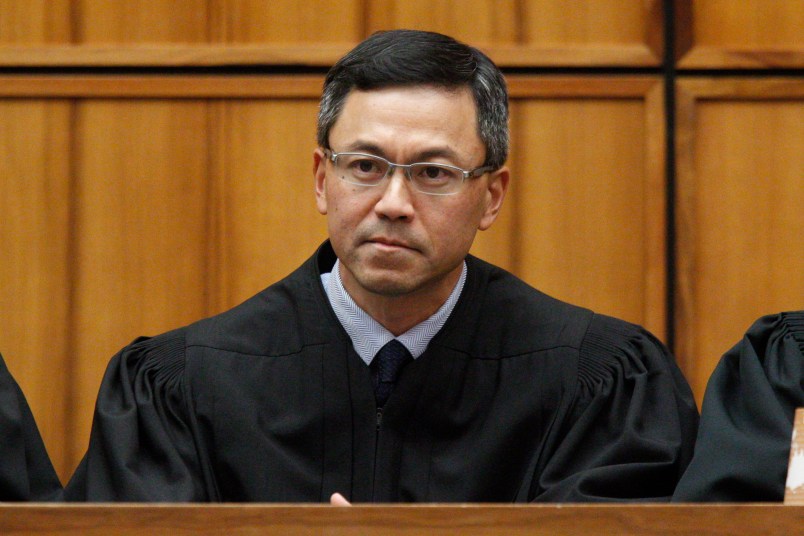HONOLULU (AP) — A federal judge in Hawaii questioned a government attorney Wednesday who urged him to narrow his order blocking President Donald Trump’s travel ban after arguing that a freeze on the nation’s refugee program had no effect on the state.
U.S. District Judge Derrick Watson heard arguments on whether to extend his temporary order until Hawaii’s lawsuit works its way through the courts. He said he would issue a written ruling by day’s end.
Hawaii says the policy discriminates against Muslims and hurts the state’s economy. The implied message in the revised ban is like a “neon sign flashing ‘Muslim Ban, Muslim Ban'” that the government didn’t bother to turn off, state Attorney General Douglas Chin told the judge.
The government says the ban falls within the president’s power to protect national security. Hawaii has only made generalized concerns about its effect on students and tourism, Department of Justice attorney Chad Readler said Wednesday.
Participating by telephone, Readler asked Watson to be guided by narrower rulings blocking only the part of Trump’s executive order that suspends new visas for people from six Muslim-majority countries.
Watson said the government only argued for the narrower interpretation after a federal judge in Maryland blocked the six-nation travel ban but not the suspension of the refugee program. That judge said it wasn’t clear that the refugee freeze was similarly motivated by religious bias.
Watson noted that the government said 20 refugees were resettled in Hawaii since 2010.
“Is this a mathematical exercise that 20 isn’t enough? … What do I make of that?” the judge asked Readler.
The government attorney replied that 20 is simply a small number of refugees.
“In whose judgment?” Watson asked.
Constitutional harm exists regardless of the number of people affected or for how long, Hawaii’s attorney general said.
In his arguments, Chin quoted Trump’s comments that the revised travel ban is a “watered down” version of the original.
“We cannot fault the president for being politically incorrect, but we do fault him for being constitutionally incorrect,” Chin said.
Earlier this month, Watson prevented the federal government from suspending new visas for people from Somalia, Iran, Syria, Sudan, Libya and Yemen and freezing the nation’s refugee program. His ruling came just hours before the federal government planned to start enforcing Trump’s executive order.
The judge, nominated to the bench by former President Barack Obama in 2012, had agreed with Hawaii that the ban would hurt the state’s tourism-dependent economy and that it discriminates based on nationality and religion.
Trump called Watson’s ruling an example of “unprecedented judicial overreach.”
Hawaii’s ruling would not be directly affected by a decision siding with the federal government in the Maryland case, legal experts said. The 4th U.S. Circuit Court of Appeals set a hearing for May 8 to consider the administration’s appeal.
“What a ruling in 4th Circuit in favor of the administration would do is create a split in authority between federal courts in different parts of the country,” said Richard Primus, a professor of constitutional law at the University of Michigan law school.
“Cases with splits in authority are cases the U.S. Supreme Court exists to resolve,” he said.
Copyright 2017 The Associated Press. All rights reserved. This material may not be published, broadcast, rewritten or redistributed.







Just think how much more damage a competent President could have done. Much of the rulings against Trump have been based on his own words and those of his surrogates. If he had had just a smidge of self-control, a limited ability to keep his mouth shut, the case against him would be much more difficult.
Great line about being constitutionally incorrect… it must be very hard on the dear leader that thinks he has the right to make his own “rules.”
What continues to astound me is how incompetent all of the cabinet appointees are. Did they really think they could write and issue executive orders without checking on their legality??? Bravo to this judge (and we should expect a tweet storm in the near future.)